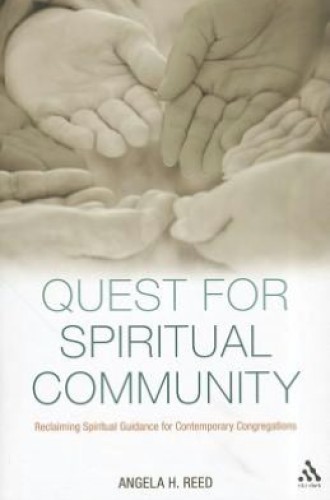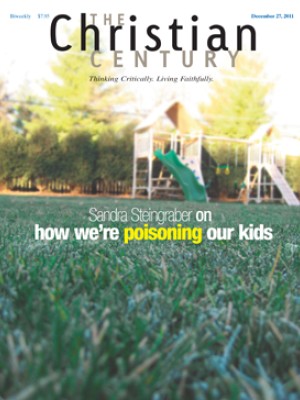Quest for Spiritual Community, by Angela H. Reed
A few years ago our local group of clergy met to discuss the level of spiritual maturity in our congregations. What put us onto the topic was research from Willow Creek Community Church that found no correlation between high involvement in the normal activities of congregational life and growth toward spiritual maturity.
The researchers discovered that although congregations generally fostered growth in the early to middle range of spiritual maturity, they were not doing much to further continuing growth in their most spiritually mature members. Indeed, some of those members were leaving congregations in a quest for avenues of spiritual growth that were only available elsewhere.
Read our latest issue or browse back issues.
In my clergy group these findings came like a slap in the face. But we agreed that they described what we sensed to be true in our congregations, which were generally not doing much to foster spiritual growth, especially in more mature people. Around the table that day, we lamented how much energy we pour into bazaars and spaghetti suppers while the more important work of spiritual growth languishes. Our desire is for congregations to become flourishing greenhouses, but few of us had any idea what nutrients might lead to the kind of growth we are hoping for.
My clergy group might like to read Angela Reed's Quest for Spiritual Community. Reed maintains that congregations provide the best greenhouses for authentic spiritual guidance. However, she contends, maturity does not simply grow from ordinary congregational life; rather, it is the fruit of ministries of spiritual guidance.
The book is a revised version of Reed's Princeton dissertation, but she avoids academic jargon and convoluted sentences. She begins with a simple question that few people have yet researched: What happens in congregational life when a pastor or key lay leader receives training in spiritual guidance and then initiates some form of that ministry in the congregation? For several decades now, programs from a wide array of denominational traditions have been training spiritual directors. What effects do those trained people have on spiritual formation when they return to their local congregations?
To find answers, Reed selected three Presbyterian and three Mennonite congregations in North America where at least one pastor or layperson was trained in spiritual direction and had developed a ministry of spiritual guidance lasting for at least two years and involving at least four persons. She then conducted interviews with church members and collected observations by participating in worship and other communal activities.
Reed, who teaches practical theology and spiritual formation at Baylor University's George W. Truett Theological Seminary, discovered that pastors in these congregations consistently imagined their role to be that of spiritual guide. They listened more than talked, they had right-sized rather than out-sized views of themselves, they helped others notice God's fingerprints in daily life, they developed a congregational culture of spiritual conversation, and they understood success as a matter of surrendering to God rather than fixing problems.
Such leaders, Reed found, had salubrious effects on their congregations. People in the congregation were more aware of God during the week, entertained new images and ideas of God, felt a heightened sense of belonging to the congregation, grew in their ability to discern calls to ministry and service, and seemed ready to support the congregation's mission.
Quest for Spiritual Community is no mere research report. Reed uses Jürgen Moltmann's theology of the Holy Spirit to construct a framework for spiritual guidance. Rather than laying out a rigid programmatic agenda, she offers a way to understand the congregation as God's primary locus for spiritual guidance, one that fosters spiritual maturity through one-on-one spiritual direction, spiritual friendships and small-group spiritual direction.
Reed's work proffers at least two gifts. First, she proposes that congregational ministries of spiritual guidance can provide a congenial environment for spiritual questers of all ages who are tempted to search for God outside of church life. Arguing that the person who goes it alone will necessarily be spiritually truncated, she knows that only the communal context of a congregation with the Trinity at its heart can shape authentic spiritual maturity.
Second, she turns the reader's gaze back to the congregational context of Christian spirituality. The academic discipline of Christian spirituality has long attended to historical and theological contexts, and more recently to cultural, ethnic and social contexts, but writers have rarely inquired about the ecclesiological context of the lived experience of Christian faith and practice. Her passion for congregations winsomely beckons us to treasure anew these earthen vessels.
Reed implicitly celebrates a growing trend for pastors and other congregational leaders to be trained in ministries of spiritual guidance. At the same time, her book nudges training programs to imagine ways of not only teaching the classic model of one-on-one spiritual direction, but also of preparing students to lead spiritual direction small groups and to guide whole congregations as corporate bodies.
What of congregations that don't have pastors or key lay leaders who've been trained in spiritual guidance? Reed admits that not every pastor is called to practice formal spiritual direction. However, she rightly points out that with greater or lesser awareness all pastors engage in spiritual guidance. Everything a congregation does, from worship to mission, affects the spiritual formation of participants. Reed is a trustworthy guide who helps us ponder how cultivating spiritual guidance in our congregations might cause spiritual maturity to flourish.






